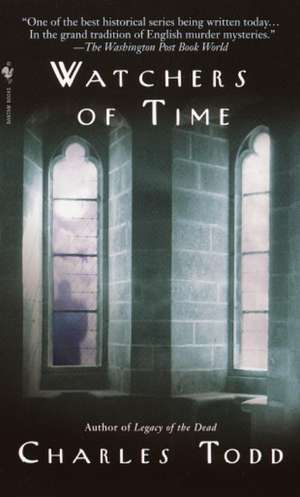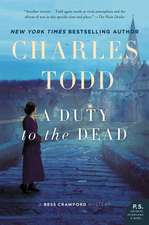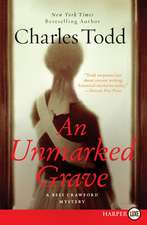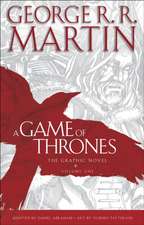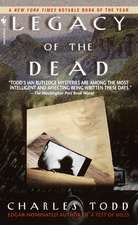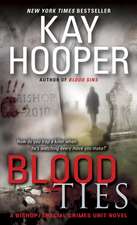Watchers of Time: An Inspector Ian Rutledge Novel: Inspector Ian Rutledge
Autor Todd, Charles Todden Limba Engleză Paperback – 30 iun 2002
Watchers of Time
In Osterley, a marshy Norfolk backwater, a man lies dying on a rainy autumn night. While natural causes will surely claim Herbert Baker’s life in a matter of hours, his last request baffles his family and friends.
Baker, a devout Anglican, inexplicably demands to see the town’s Catholic priest for a last confession. The old man dies without knowing that the very priest who gave him comfort will follow him to the grave just a few weeks later — the victim of an appalling murder.
The local police are convinced the evidence points to an interrupted robbery, and have named a suspect, Matthew Walsh. But the dead priest’s bishop insists that Scotland Yard oversee the investigation. A simple task for Rutledge, a man not yet well enough to return to full duty.
The Inspector draws on years of experience and a war-honed intuition as he finds himself uncovering secrets that the local authorities would prefer not to see explored. Surely, they reason, it is better to charge an outsider — Matthew Walsh — with murder than to learn that someone in this tightly knit community would commit such a horrendous crime. And yet there are those, Rutledge soon discovers, who held grudges against the priest that had little to do with God or the Church.
No one in Osterley is aware that Rutledge hears voices — or, rather, one haunting voice: that of a soldier he was forced to execute during the War. It is with the voice of Hamish MacLeod, by turns second-guessing and taunting him, that Rutledge begins a journey toward the devastating truth that will unlock the secrets of Osterley and pare away its layers of deception.
And in piecing together a different story, Rutledge encounters a chain of events that stretches from these brooding marshes to one of the greatest sea disasters in history — the sinking of the Titanic. Who is the mysterious woman who may have boarded that ship ... and who is the secretive woman who survived it? Rutledge comes to believe that he alone can stop a killer from striking again.
Deftly capturing the anguish of a man haunted by his tragic past, Watchers of Time delves beneath a cast of unforgettable characters to examine a mystery even greater than murder: the mystery of what is right and what is wrong after the world has committed the sin of war.
From the Hardcover edition.
Preț: 52.55 lei
Nou
Puncte Express: 79
Preț estimativ în valută:
10.06€ • 10.49$ • 8.36£
10.06€ • 10.49$ • 8.36£
Carte disponibilă
Livrare economică 28 februarie-14 martie
Preluare comenzi: 021 569.72.76
Specificații
ISBN-13: 9780553583168
ISBN-10: 0553583166
Pagini: 448
Dimensiuni: 107 x 175 x 26 mm
Greutate: 0.22 kg
Ediția:Bantam Mass Mar
Editura: Bantam
Seria Inspector Ian Rutledge
ISBN-10: 0553583166
Pagini: 448
Dimensiuni: 107 x 175 x 26 mm
Greutate: 0.22 kg
Ediția:Bantam Mass Mar
Editura: Bantam
Seria Inspector Ian Rutledge
Notă biografică
Charles Todd is the author of Legacy of the Dead, A Test of Wills, Wings of Fire, and Search the Dark. He lives on the East Coast, where he is at work on the next novel in the Inspector Ian Rutledge series, A Fearsome Doubt.
From the Hardcover edition.
From the Hardcover edition.
Extras
CHAPTER 1
SEPTEMBER 1919
Osterley Dr. Stephenson turned away from the bed where the dying man lay breathing so lightly the blanket over his thin chest barely stirred. His bony, restless fingers plucking at the edge of the wool were the only signs of life and awareness. Twice the young woman sitting on the bed beside him had tried to still them, covering them with her own, but her father’s hand picked up the silent tattoo again, like a drummer remembering his place, as soon as she released it. He had already frayed an inch of the binding. She gave up and sat back, sighing.
His face was grooved by illness, and a stubble of beard emphasized the lines, like a rough landscape of suffering below the sun-weathered skin of forehead and nose. Shaggy gray eyebrows hung heavily over the sunken lids. Age weighed him down, but there was a certain strength there as well, as if life had made him fight for all he had, and he had not forgotten the battles.
Catching the eyes of the man’s sons, who were standing on the far side of the bed, faces in shadows cast by the scarf draped over the lamp’s shade, the doctor nodded toward the window across the room, out of earshot of the patient. The young woman looked up as they moved away, but stayed where she was. She didn’t want to hear what was being whispered.
Another gust of wind swept the front of the house, and rain was driven heavily against the panes, rattling them. The storm had stalled, as they sometimes did here along the coast, reluctant to move inland and lose itself in the hilly terrain there. For three hours or more it had hovered over the village, flailing everyone and everything out in the open.
The older of the two brothers bent his head to catch the words as Stephenson said softly, “He’s moving comfortably and peacefully toward the end. There’s nothing more I can do. But he might wish to have Mr. Sims here? And I should think your sister would be comforted as well.”
Mr. Sims was the Vicar.
The younger brother answered, “Yes. I’ll go for him, then.” He went quietly across the room to the door. The scarf that shaded the lamp by the bed riffled as he passed, and the light flashed once across his face. There were wet trails of tears on his cheeks.
His sister reached out and briefly took his rough hand.
The other brother sighed. “He’s had a long life, Pa has. But not that long. Sixty-four. We’d thought he’d be with us another five, ten years. His own father lived to just past eighty. And Uncle Tad’s young for seventy-six.” He shook his head.
“Your uncle Thadeus has the constitution of an ox,” Stephenson agreed. “He may well outlive your grandfather’s years. But your father’s heart has given out, and his body must follow.” He studied the grieving man’s face, noting the deep lines of worry and sleeplessness. Hetty Baldwin, his housekeeper’s daughter, was getting a good man in Martin Baker, the doctor told himself. Much like Herbert in character, God-fearing, with strong ties to his family and a fierce sense of duty. It was a sound match. “Everything happens in God’s own time, you know. Even this. And it’s a kindness that he won’t linger.” He spoke the words as comfort, then nodded toward the bed. “See if you can persuade Elly to rest a little. She’s hardly stirred from his side since yesterday morning. We’ll call her if there’s any urgency. She will only wear herself into collapse, driving herself like this.”
“I’ve tried, to no avail.” Martin turned toward the window, lifting the curtain and pulling aside the shade a little to look out. Rain ran down the glass in rivulets, pushed against the house by the wind. A filthy night, he thought. A fitting night for death to come. . . . He dropped the shade back in place and said to Dr. Stephenson, “There’s naught to be done to make it easier on her?”
“I’ll leave something. A sleeping draught. Give it to Elly in a glass of water, when your father is gone. And, Martin, see that Dick doesn’t insist on being one of the pallbearers. That shoulder of his is not fully healed, and the socket will never be as strong as it was. He’s not out of the woods yet. He could still lose the arm if he’s not careful. The army surgeons can’t work miracles without a little help!”
“I’ll remember.”
“Good man!” A clap on Martin’s shoulder for comfort, and then Stephenson walked back to the bed. He reached down and touched Elly’s hands, folded tightly in her lap. They were cold, shaking. “Your father is comfortable. He would want you to be the same. Let Martin fetch you a shawl, at least.”
She nodded, unable to reply. The gray head on the pillow moved, first to the right, then toward the left. Herbert Baker’s eyes opened, and focused on his daughter’s face. He said in a gravelly voice, “I want a priest.”
The doctor leaned down and replied reassuringly, “Yes, Dick has just gone to fetch Mr. Sims.”
“I want a priest!” the old man repeated querulously.
“He’s coming, Papa!” Elly said, fighting her tears. “Can you hear me? He’ll be here quite soon. ”
“Priest,” her father demanded. “Not Vicar.”
“Herbert,” the doctor said soothingly, “let me lift you while Elly gives you a little water. ”
The dark, pleading eyes shifted to the doctor’s face. “I want a priest,” the dying man said very clearly this time, refusing to be distracted.
The bedroom door opened and Dick was ushering in the Vicar. “I met him on his way here,” he told them. “Coming to see if we had need of him.”
Mr. Sims was taller than Dick, thinner, and not much older. “I’ve been sitting with Mrs. Quarles, and thought it best to call on you before going home,” the Vicar explained. Herbert Baker had taken all day to die. Most of the town knew the end was near, a matter of hours at best. Sims had stopped in twice before.
Sims reached out to touch Elly’s arm, saying easily, “Ellen, do you think you could find a cup of tea for us? We could use the warmth on such a wet night.”
She flushed shyly. “Tea? Oh, yes. I’ve just to put the kettle on.”
Smoothing the blanket over her father, she got up, leaving the room with reluctance. Sims took the place on the bed that she’d vacated and squarely met the intent eyes of the old man. “You’ve had a good life, Herbert Baker. You were married to a fine woman, a caring wife and a devoted mother. Both your sons survived the War, and have work. Elly is a lovely girl. God has been kind to you.”
“Thank’ee, Vicar, and I’ll have you say a prayer for me after the priest goes!”
The Vicar looked up at Martin, then said, “Dr. Stephenson?”
“He’s been asking for a priest. Just now, before you came in. I don’t know why, ”
Dick said, “Father James is the only priest in Osterley. He’s a Catholic, ”
“That’s right, he’s the one!” Herbert Baker said with more will than strength. Something in the depths of his eyes flared with hope.
Martin said, “If that’s what he wants, humor him, then. Dick, go and see if Father James will come here.” His brother hesitated, glancing uneasily at the Vicar, as if he’d just been asked to commit heresy. But Mr. Sims nodded encouragement, and Dick went out the door.
Martin said, “You’ll stay?” to Sims.
From the bed came the single word “Stay.” The lined face was exhausted, as if speaking was a greater effort than he could manage.
Sims replied, “I’ll go to the kitchen, then. From the look of her, Ellen is more in need of that tea than I am!” Rising from the bed, he added gently, “I’ll be within call, Herbert. Never fear.” His smile was reassuring.
Herbert nodded; his eyes closed. The wind had dropped again and on the roof overhead the rain seemed to fall softly now, with a summer patter.
Dr. Stephenson said quietly to Sims, “He’s sound enough in his mind. But dying men often have whims like this. Best to humor him!”
“Yes. I knew a wounded man in the War who wanted to be buried with his little dog. Only he didn’t have a dog. But when they came to bury him, his arms were folded across his chest as if he’d held one as he died. Strange comfort, but who are we to question?”
The Vicar went out the door, shutting it quietly behind him. There were voices on the stairs. Sims speaking to Ellen. And then they went down again together.
The room was silent. Martin watched his father for a time, and then said anxiously to Stephenson, “It’ll be an easy passing?”
“As easy as any. His heart will stop. And his breathing will follow. He will be asleep long before that. I didn’t expect him to wake at all. I thought he’d reached the last stage.”
Herbert, roused by their voices, said, “Is the priest here, then?”
“Not yet, Papa,” Martin answered, lowering himself to sit on the bed. “Dick’s gone to fetch him.” He gripped his father’s hands, unable to say anything, a plain man with few graces. But the warmth of his fingers seemed to give a measure of peace to his dying father. Martin cleared his throat hoarsely, warmed in his turn.
The silence lengthened. After nearly a quarter of an hour, Dick came in, bringing a short and balding man of middle age in his wake. Father James greeted Stephenson with a nod and came to shake Martin’s outstretched hand. His fingers were cold from the night air. “I understand your father has been asking for a priest,” he said, his face showing only concern.
“I don’t know why, Father. ”
“Nor does it matter. I’ll speak to him, then, shall I?” It was a question asked gracefully, setting Martin at his ease. The priest turned quietly to bend over the bed. After a moment he said, “Mr. Baker? Herbert? It’s Father James. What can I do to help you?”
Baker opened his eyes, seemed to have difficulty focusing them, then blinked as he looked up at the white cleri- cal collar, clearly visible against the black cloth. “Father James, is it?”
“Yes.” As a thin, trembling hand came out from under the blanket, Father James reached for it and the claw seemed to lock onto his.
“Send them away!” Herbert Baker said. “Just you and me.”
Father James glanced across at the anxious faces of Baker’s two sons and then at Dr. Stephenson. The three men nodded briefly, walked to the door, and went out, their shoes loud on the wide boards of the passage, then moving together down the stairs.
Father James, waiting until they were well out of earshot, looked around to collect some impression of this man lying in the bed waiting for death to come. He knew who the Bakers were, but had seldom exchanged more than a word or two with any of them.
It was a big room set under the eaves, with simple but sturdy furnishings, and a worn carpet on the floor. Someone had painted watercolors of the sea and framed them for hanging. An amateur’s hand, the sunrises and ships vigorous, but showing an untrained eye. The family had taken pride in them, to frame them. The single window faced the street, the shade pulled against the night and the curtains drawn across it.
So many houses in the town had this same air of working-class austerity, Father James found himself thinking. Osterley’s years of prosperity lay in the past, well before Herbert Baker’s time. No one starved, but people here worked hard for their bread.
As the priest turned back to the bed, he saw the woman’s photograph on the table beside it. The soft whisper of the rain faded, then revived as a squall, the wind sending a gust of drafts into the house and making the lamp dance to its fitful tune. Baker’s wife? She had died before the War, as he recalled, and this must have been taken some ten years before that. The daughter, Ellen?, looked much like her. The same dark hair and sweet face, staring at the camera with trusting and expectant eyes.
He sat down carefully on the bed’s edge, where Ellen and the Vicar had sat before him, and said in the voice that was his greatest gift as a priest, deep and steadfast, “I’m here. We are alone in the sight of God. In the name of the Father, the Son, and the Holy Spirit, tell me how I may serve you?”
SEPTEMBER 1919
Osterley Dr. Stephenson turned away from the bed where the dying man lay breathing so lightly the blanket over his thin chest barely stirred. His bony, restless fingers plucking at the edge of the wool were the only signs of life and awareness. Twice the young woman sitting on the bed beside him had tried to still them, covering them with her own, but her father’s hand picked up the silent tattoo again, like a drummer remembering his place, as soon as she released it. He had already frayed an inch of the binding. She gave up and sat back, sighing.
His face was grooved by illness, and a stubble of beard emphasized the lines, like a rough landscape of suffering below the sun-weathered skin of forehead and nose. Shaggy gray eyebrows hung heavily over the sunken lids. Age weighed him down, but there was a certain strength there as well, as if life had made him fight for all he had, and he had not forgotten the battles.
Catching the eyes of the man’s sons, who were standing on the far side of the bed, faces in shadows cast by the scarf draped over the lamp’s shade, the doctor nodded toward the window across the room, out of earshot of the patient. The young woman looked up as they moved away, but stayed where she was. She didn’t want to hear what was being whispered.
Another gust of wind swept the front of the house, and rain was driven heavily against the panes, rattling them. The storm had stalled, as they sometimes did here along the coast, reluctant to move inland and lose itself in the hilly terrain there. For three hours or more it had hovered over the village, flailing everyone and everything out in the open.
The older of the two brothers bent his head to catch the words as Stephenson said softly, “He’s moving comfortably and peacefully toward the end. There’s nothing more I can do. But he might wish to have Mr. Sims here? And I should think your sister would be comforted as well.”
Mr. Sims was the Vicar.
The younger brother answered, “Yes. I’ll go for him, then.” He went quietly across the room to the door. The scarf that shaded the lamp by the bed riffled as he passed, and the light flashed once across his face. There were wet trails of tears on his cheeks.
His sister reached out and briefly took his rough hand.
The other brother sighed. “He’s had a long life, Pa has. But not that long. Sixty-four. We’d thought he’d be with us another five, ten years. His own father lived to just past eighty. And Uncle Tad’s young for seventy-six.” He shook his head.
“Your uncle Thadeus has the constitution of an ox,” Stephenson agreed. “He may well outlive your grandfather’s years. But your father’s heart has given out, and his body must follow.” He studied the grieving man’s face, noting the deep lines of worry and sleeplessness. Hetty Baldwin, his housekeeper’s daughter, was getting a good man in Martin Baker, the doctor told himself. Much like Herbert in character, God-fearing, with strong ties to his family and a fierce sense of duty. It was a sound match. “Everything happens in God’s own time, you know. Even this. And it’s a kindness that he won’t linger.” He spoke the words as comfort, then nodded toward the bed. “See if you can persuade Elly to rest a little. She’s hardly stirred from his side since yesterday morning. We’ll call her if there’s any urgency. She will only wear herself into collapse, driving herself like this.”
“I’ve tried, to no avail.” Martin turned toward the window, lifting the curtain and pulling aside the shade a little to look out. Rain ran down the glass in rivulets, pushed against the house by the wind. A filthy night, he thought. A fitting night for death to come. . . . He dropped the shade back in place and said to Dr. Stephenson, “There’s naught to be done to make it easier on her?”
“I’ll leave something. A sleeping draught. Give it to Elly in a glass of water, when your father is gone. And, Martin, see that Dick doesn’t insist on being one of the pallbearers. That shoulder of his is not fully healed, and the socket will never be as strong as it was. He’s not out of the woods yet. He could still lose the arm if he’s not careful. The army surgeons can’t work miracles without a little help!”
“I’ll remember.”
“Good man!” A clap on Martin’s shoulder for comfort, and then Stephenson walked back to the bed. He reached down and touched Elly’s hands, folded tightly in her lap. They were cold, shaking. “Your father is comfortable. He would want you to be the same. Let Martin fetch you a shawl, at least.”
She nodded, unable to reply. The gray head on the pillow moved, first to the right, then toward the left. Herbert Baker’s eyes opened, and focused on his daughter’s face. He said in a gravelly voice, “I want a priest.”
The doctor leaned down and replied reassuringly, “Yes, Dick has just gone to fetch Mr. Sims.”
“I want a priest!” the old man repeated querulously.
“He’s coming, Papa!” Elly said, fighting her tears. “Can you hear me? He’ll be here quite soon. ”
“Priest,” her father demanded. “Not Vicar.”
“Herbert,” the doctor said soothingly, “let me lift you while Elly gives you a little water. ”
The dark, pleading eyes shifted to the doctor’s face. “I want a priest,” the dying man said very clearly this time, refusing to be distracted.
The bedroom door opened and Dick was ushering in the Vicar. “I met him on his way here,” he told them. “Coming to see if we had need of him.”
Mr. Sims was taller than Dick, thinner, and not much older. “I’ve been sitting with Mrs. Quarles, and thought it best to call on you before going home,” the Vicar explained. Herbert Baker had taken all day to die. Most of the town knew the end was near, a matter of hours at best. Sims had stopped in twice before.
Sims reached out to touch Elly’s arm, saying easily, “Ellen, do you think you could find a cup of tea for us? We could use the warmth on such a wet night.”
She flushed shyly. “Tea? Oh, yes. I’ve just to put the kettle on.”
Smoothing the blanket over her father, she got up, leaving the room with reluctance. Sims took the place on the bed that she’d vacated and squarely met the intent eyes of the old man. “You’ve had a good life, Herbert Baker. You were married to a fine woman, a caring wife and a devoted mother. Both your sons survived the War, and have work. Elly is a lovely girl. God has been kind to you.”
“Thank’ee, Vicar, and I’ll have you say a prayer for me after the priest goes!”
The Vicar looked up at Martin, then said, “Dr. Stephenson?”
“He’s been asking for a priest. Just now, before you came in. I don’t know why, ”
Dick said, “Father James is the only priest in Osterley. He’s a Catholic, ”
“That’s right, he’s the one!” Herbert Baker said with more will than strength. Something in the depths of his eyes flared with hope.
Martin said, “If that’s what he wants, humor him, then. Dick, go and see if Father James will come here.” His brother hesitated, glancing uneasily at the Vicar, as if he’d just been asked to commit heresy. But Mr. Sims nodded encouragement, and Dick went out the door.
Martin said, “You’ll stay?” to Sims.
From the bed came the single word “Stay.” The lined face was exhausted, as if speaking was a greater effort than he could manage.
Sims replied, “I’ll go to the kitchen, then. From the look of her, Ellen is more in need of that tea than I am!” Rising from the bed, he added gently, “I’ll be within call, Herbert. Never fear.” His smile was reassuring.
Herbert nodded; his eyes closed. The wind had dropped again and on the roof overhead the rain seemed to fall softly now, with a summer patter.
Dr. Stephenson said quietly to Sims, “He’s sound enough in his mind. But dying men often have whims like this. Best to humor him!”
“Yes. I knew a wounded man in the War who wanted to be buried with his little dog. Only he didn’t have a dog. But when they came to bury him, his arms were folded across his chest as if he’d held one as he died. Strange comfort, but who are we to question?”
The Vicar went out the door, shutting it quietly behind him. There were voices on the stairs. Sims speaking to Ellen. And then they went down again together.
The room was silent. Martin watched his father for a time, and then said anxiously to Stephenson, “It’ll be an easy passing?”
“As easy as any. His heart will stop. And his breathing will follow. He will be asleep long before that. I didn’t expect him to wake at all. I thought he’d reached the last stage.”
Herbert, roused by their voices, said, “Is the priest here, then?”
“Not yet, Papa,” Martin answered, lowering himself to sit on the bed. “Dick’s gone to fetch him.” He gripped his father’s hands, unable to say anything, a plain man with few graces. But the warmth of his fingers seemed to give a measure of peace to his dying father. Martin cleared his throat hoarsely, warmed in his turn.
The silence lengthened. After nearly a quarter of an hour, Dick came in, bringing a short and balding man of middle age in his wake. Father James greeted Stephenson with a nod and came to shake Martin’s outstretched hand. His fingers were cold from the night air. “I understand your father has been asking for a priest,” he said, his face showing only concern.
“I don’t know why, Father. ”
“Nor does it matter. I’ll speak to him, then, shall I?” It was a question asked gracefully, setting Martin at his ease. The priest turned quietly to bend over the bed. After a moment he said, “Mr. Baker? Herbert? It’s Father James. What can I do to help you?”
Baker opened his eyes, seemed to have difficulty focusing them, then blinked as he looked up at the white cleri- cal collar, clearly visible against the black cloth. “Father James, is it?”
“Yes.” As a thin, trembling hand came out from under the blanket, Father James reached for it and the claw seemed to lock onto his.
“Send them away!” Herbert Baker said. “Just you and me.”
Father James glanced across at the anxious faces of Baker’s two sons and then at Dr. Stephenson. The three men nodded briefly, walked to the door, and went out, their shoes loud on the wide boards of the passage, then moving together down the stairs.
Father James, waiting until they were well out of earshot, looked around to collect some impression of this man lying in the bed waiting for death to come. He knew who the Bakers were, but had seldom exchanged more than a word or two with any of them.
It was a big room set under the eaves, with simple but sturdy furnishings, and a worn carpet on the floor. Someone had painted watercolors of the sea and framed them for hanging. An amateur’s hand, the sunrises and ships vigorous, but showing an untrained eye. The family had taken pride in them, to frame them. The single window faced the street, the shade pulled against the night and the curtains drawn across it.
So many houses in the town had this same air of working-class austerity, Father James found himself thinking. Osterley’s years of prosperity lay in the past, well before Herbert Baker’s time. No one starved, but people here worked hard for their bread.
As the priest turned back to the bed, he saw the woman’s photograph on the table beside it. The soft whisper of the rain faded, then revived as a squall, the wind sending a gust of drafts into the house and making the lamp dance to its fitful tune. Baker’s wife? She had died before the War, as he recalled, and this must have been taken some ten years before that. The daughter, Ellen?, looked much like her. The same dark hair and sweet face, staring at the camera with trusting and expectant eyes.
He sat down carefully on the bed’s edge, where Ellen and the Vicar had sat before him, and said in the voice that was his greatest gift as a priest, deep and steadfast, “I’m here. We are alone in the sight of God. In the name of the Father, the Son, and the Holy Spirit, tell me how I may serve you?”
Recenzii
Praise for the novels of Charles Todd:
Legacy of the Dead
A New York Times Notable Book of the Year
“Eloquent ... rich.”
— The New York Times Book Review
“Readers will continue to be captivated by Todd’s portrait of the dangerously unraveling detective, and his equally incisive evocation of the grieving post-war world.”
— Publishers Weekly
Search the Dark
“Todd works ... volatile elements into a remarkable village mystery ... driven by characters of great psychological complexity.”
— The New York Times Book Review
“Todd’s Ian Rutledge mysteries are among the most intelligent and affecting being written these days.”
— The Washington Post Book World
Wings of Fire
A New York Times Notable Book of the Year
“[Todd wraps] his challenging plot, complex characters, and subtle psychological insights in thick layers of atmosphere.”
— The New York Times Book Review
“A strong mystery, filled with fine characterizations [and] a superb eye for Cornwall ... Wise and wily.”
— The Boston Globe
A Test of Wills
A New York Times Notable Book of the Year
“Todd gives us a superb characterization of a man whose wounds have made him into a stranger in his own land, and a disturbing portrait of a country intolerant of all strangers.”
— The New York Times Book Review
“The emotional and physical carnage in World War I is used to remarkable effect.”
— Chicago Tribune
From the Hardcover edition.
Legacy of the Dead
A New York Times Notable Book of the Year
“Eloquent ... rich.”
— The New York Times Book Review
“Readers will continue to be captivated by Todd’s portrait of the dangerously unraveling detective, and his equally incisive evocation of the grieving post-war world.”
— Publishers Weekly
Search the Dark
“Todd works ... volatile elements into a remarkable village mystery ... driven by characters of great psychological complexity.”
— The New York Times Book Review
“Todd’s Ian Rutledge mysteries are among the most intelligent and affecting being written these days.”
— The Washington Post Book World
Wings of Fire
A New York Times Notable Book of the Year
“[Todd wraps] his challenging plot, complex characters, and subtle psychological insights in thick layers of atmosphere.”
— The New York Times Book Review
“A strong mystery, filled with fine characterizations [and] a superb eye for Cornwall ... Wise and wily.”
— The Boston Globe
A Test of Wills
A New York Times Notable Book of the Year
“Todd gives us a superb characterization of a man whose wounds have made him into a stranger in his own land, and a disturbing portrait of a country intolerant of all strangers.”
— The New York Times Book Review
“The emotional and physical carnage in World War I is used to remarkable effect.”
— Chicago Tribune
From the Hardcover edition.
Descriere
When a priest is brutally murdered after giving a dying man last rites, Scotland Yard's Inspector Ian Rutledge, a former officer still recovering from the Great War, thinks it's a simple case. However, Rutledge uncovers secrets the local authorities would prefer not to see explored and pieces together a chain of events that stretches from the marshes of Norfolk to the sinking of the "Titanic." (August)
